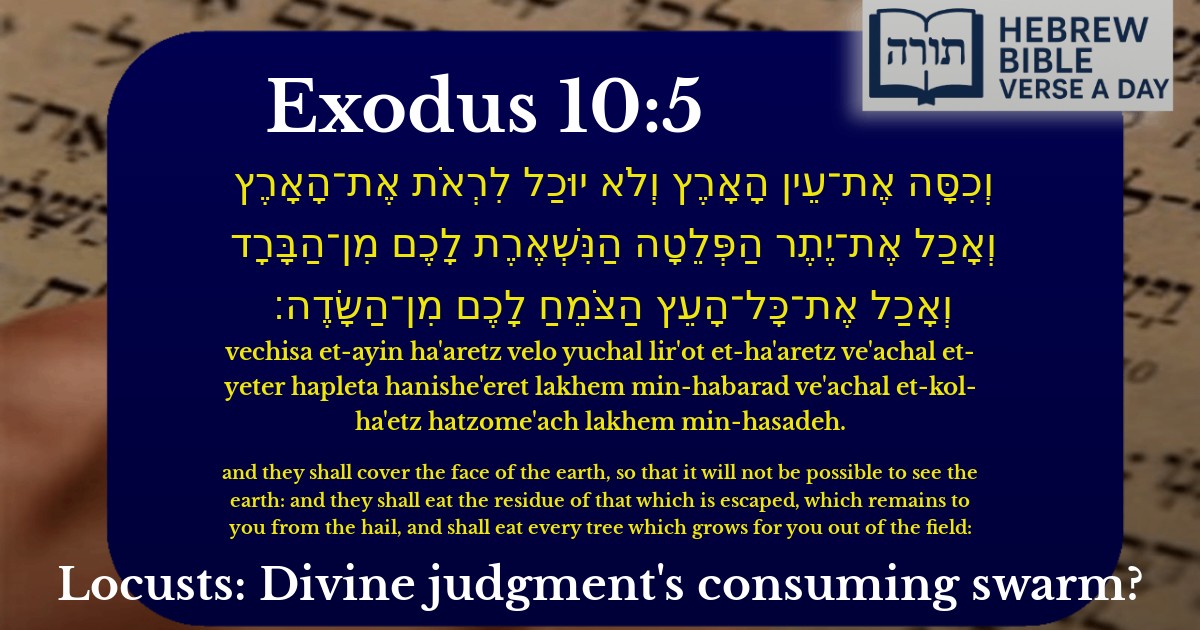Join Our Newsletter To Be Informed When New Videos Are Posted
Join the thousands of fellow Studends who rely on our videos to learn how to read the bible in Hebrew for free!
Hebrew Text
וְכִסָּה אֶת־עֵין הָאָרֶץ וְלֹא יוּכַל לִרְאֹת אֶת־הָאָרֶץ וְאָכַל אֶת־יֶתֶר הַפְּלֵטָה הַנִּשְׁאֶרֶת לָכֶם מִן־הַבָּרָד וְאָכַל אֶת־כָּל־הָעֵץ הַצֹּמֵחַ לָכֶם מִן־הַשָּׂדֶה׃
English Translation
and they shall cover the face of the earth, so that it will not be possible to see the earth: and they shall eat the residue of that which is escaped, which remains to you from the hail, and shall eat every tree which grows for you out of the field:
Transliteration
Vechisa et-ayin ha'aretz velo yuchal lir'ot et-ha'aretz ve'achal et-yeter hapleta hanishe'eret lakhem min-habarad ve'achal et-kol-ha'etz hatzome'ach lakhem min-hasadeh.
Hebrew Leining Text
וְכִסָּה֙ אֶת־עֵ֣ין הָאָ֔רֶץ וְלֹ֥א יוּכַ֖ל לִרְאֹ֣ת אֶת־הָאָ֑רֶץ וְאָכַ֣ל&thinsp
וְכִסָּה֙ אֶת־עֵ֣ין הָאָ֔רֶץ וְלֹ֥א יוּכַ֖ל לִרְאֹ֣ת אֶת־הָאָ֑רֶץ וְאָכַ֣ל&thinsp
🎵 Listen to leining
Parasha Commentary
📚 Talmud Citations
This verse is not quoted in the Talmud.


Context of the Verse
This verse (Exodus 10:5) is part of the warning Moshe delivers to Pharaoh regarding the impending plague of locusts. The locusts would devastate Egypt by consuming all remaining vegetation that survived the previous plague of hail. The verse emphasizes the totality of the destruction, leaving nothing for the Egyptians to sustain themselves.
Rashi's Commentary
Rashi explains that the phrase "וְכִסָּה אֶת־עֵין הָאָרֶץ" ("they shall cover the face of the earth") means the locusts would be so numerous that the ground would be completely obscured from sight. He further notes that "וְלֹא יוּכַל לִרְאֹת אֶת־הָאָרֶץ" ("so that it will not be possible to see the earth") underscores the density of the swarm, making it impossible to even glimpse the ground beneath.
Rambam's Perspective
Rambam (Maimonides) in Moreh Nevuchim (Guide for the Perplexed) discusses the natural order of plagues as divine interventions designed to demonstrate Hashem's power. The locust plague, like the others, was meticulously calculated to target Egypt's agricultural wealth, reinforcing the idea that their false deities (associated with nature and fertility) were powerless against the will of the Almighty.
Midrashic Insights
Ibn Ezra's Explanation
Ibn Ezra focuses on the phrase "אֶת־יֶתֶר הַפְּלֵטָה" ("the residue of that which is escaped"), clarifying that the locusts would consume whatever meager remnants survived the hail. This demonstrated that no effort—whether Pharaoh's stubbornness or Egypt's resilience—could thwart the divine decree.
Halachic Implications
The Talmud (Ta'anit 3b) derives from this verse that locust swarms are a form of divine punishment for societal sins, particularly corruption and injustice. The Sages later instituted fast days in response to locust infestations, linking them to repentance and prayer.